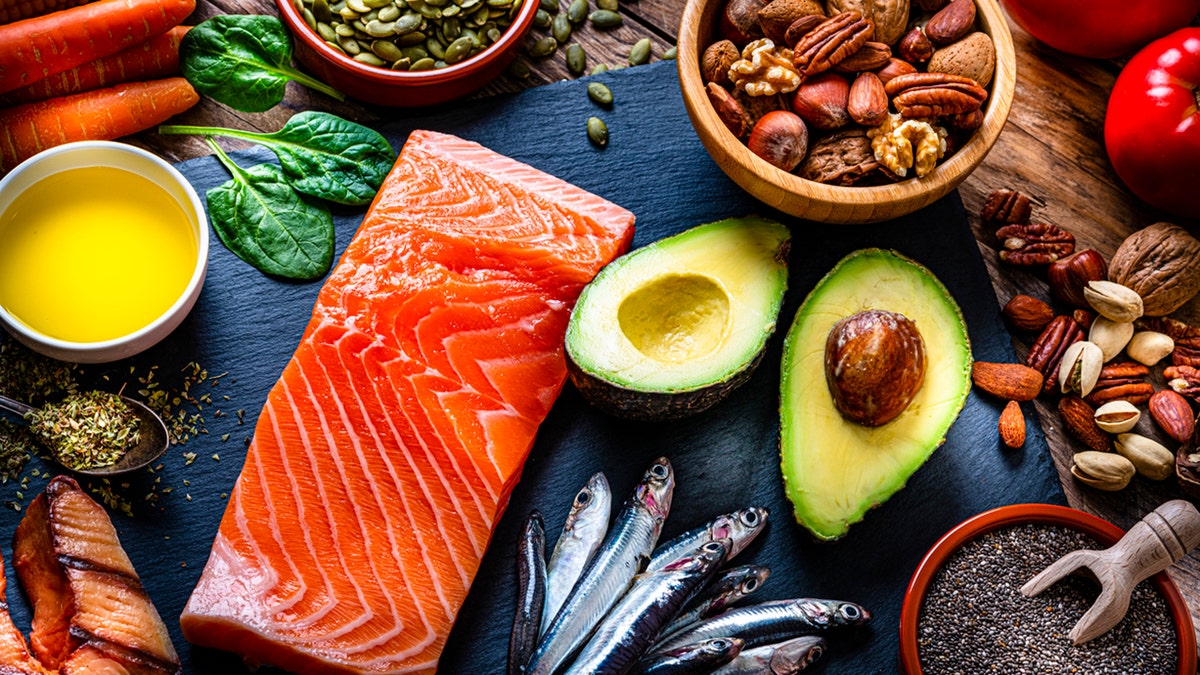When it comes to healthy eating ideas, there are a lot of different rules, trends, and advice on what is and isn't healthy.
Some of the guidance may be legitimate, but some should be taken with a pinch of salt.
Several experts and researchers from Massachusetts General Hospital Brigham Hospital in Boston have looked into some of the common dieting concepts circulating and separated fact from fiction.
Back-to-school lunch ideas for kids with a healthy and interactive twist
Here are six popular concepts and clear explanations from experts about their relevance.
True or false?
1. “Women should follow a Mediterranean diet to live longer”
truth. Recent studies have shown that the Mediterranean diet is beneficial for overall health.
Researchers at Massachusetts General Hospital evaluated six misconceptions about healthy eating, including plant-based diets and peanut butter for kids. (iStock)
Massachusetts General Hospital supports this theory with independent research showing that women who follow a nutrition plan for 25 years or more have up to a 23% lower risk of death, including reduced cardiovascular disease and cancer-related deaths.
The study also found that introducing a single ingredient into the diet reduced the long-term risk of death from certain diseases by 5%.
What is the “better” apple color for you and why? Red, green, or yellow?
The Mediterranean diet includes healthy foods such as fruits, vegetables, legumes, olive oil, nuts and fish, and avoids sugar and processed, red meats.
According to Samia Mora, M.D., director of the Lipid Metabolism Center at Brigham and Women's Hospital, most people are unaware of the impact their diet has on their health and longevity.

The Mediterranean diet includes foods such as fruits, vegetables, legumes, olive oil, nuts and fish, but avoids sugar and processed, red meats. (iStock)
“What we eat today has huge implications for living a long, healthy life,” she said in a statement to Fox News Digital.
“merit [of the Mediterranean diet] The benefits observed on both cancer and cardiovascular disease mortality, the two leading causes of death in women and men, were associated with multiple biological mechanisms, particularly reduced inflammation and insulin resistance, as well as improved metabolism.”
2. “Eliminating the offending foods is always the best treatment for digestive issues.”
error. While some people do suffer from food allergies or autoimmune diseases, experts at Massachusetts General Hospital concluded that the diet's concept is entirely flawed, as many digestive symptoms are now known to have “more complex causes.”
Peanut butter vs. jam: A nutritionist gives the truth about the two spreads in one bite
According to Kyle Stoler, MD, director of the Gastrointestinal Motility Laboratory at Massachusetts General Hospital, when patients have adverse reactions to certain foods, it's not the food itself that's causing the problem, but rather how the digestive tract is reacting to a “general” diet.

Indigestion may not just be caused by the foods you're eating, doctors said. (iStock)
“While some people have true allergies to certain foods (such as a gluten allergy in celiac disease) and others cannot digest certain foods (such as dairy in lactose intolerance), many symptoms attributed to certain foods are actually caused by the body's reaction to a meal,” he told Fox News Digital.
According to Staller, when we eat, it sets off “a cascade of neural activity in the gut,” regardless of the type of food we eat.
Sprouted grain bread may have 'enhanced nutritional value' and be a healthier way to consume carbohydrates
People with sensitive gut may experience digestive discomfort in the form of gas, bloating, or unusual feelings of fullness.
“These are what we call 'gut-brain interaction disorders,' where your digestion seems to be functioning normally but you experience abnormal sensations,” Staller says.

According to the doctor, when we eat, it sets off “a cascade of neural activity in the intestine,” regardless of the type of food we eat. (iStock)
“Irritable bowel syndrome (IBS) is the most typical example.”
According to Staller, the best way to alleviate these symptoms is to target the abnormal nervous system response and eliminate only the “most problematic” foods.
3. “Eating blueberries may reduce the risk of some eye diseases.”
truth. Researchers have found this claim to be true — blueberries are indeed good for your eyes.
Is a salad always a better choice than a sandwich? Think about it.
A study conducted by Massachusetts General Hospital on approximately 40,000 middle-aged and older women in the United States found that consuming blueberries at least once a week reduced the risk of age-related macular degeneration (AMD), an eye disease that can lead to significant vision loss, by 28%.

Eating blueberries at least once a week was found to reduce the risk of vision-deteriorating diseases by 28%. (iStock)
Dr. Howard D. Sesso, director of nutrition and supplement research at Brigham and Women's Hospital, confirmed that blueberries can optimize eye health.
“Blueberries contain anthocyanins, bioactive polyphenols that give blueberries their blue color, which may lead to reduced eye disease,” he told Fox News Digital.
4. “Eating a plant-based diet is sure to improve your health.”
This is incorrect, with a caveat. Experts at Massachusetts General Hospital say that while a plant-based diet may seem incredibly healthy on the surface, it's not necessarily the best approach.
According to Dr. Chi Sun, an associate professor of medicine at Brigham and Women's Hospital, plant-based nutrition plans offer “diverse and sometimes contrasting health benefits.”
“Diet is not a magic bullet in itself.”
A plant-based diet full of refined grains, sugary drinks and candy is very different from a diet that includes fresh fruits and vegetables, whole grains, coffee and tea, he noted.

According to experts, a plant-based diet should be a balanced diet that includes fruits, vegetables, and whole grains. (iStock)
The first meal was associated with “a number of adverse health effects,” according to the researchers.
Liver, insects, sardines — oh no!: 8 'nasty' foods recommended by nutritionists
The second diet is considered a “healthy version of a plant-based diet,” which Sun said has been “robustly associated with better health outcomes, including a reduced risk of developing diseases like diabetes, obesity and gout.”

According to experts, a “healthy version” of a plant-based diet has been proven to lower the risk of developing diseases such as diabetes, obesity and gout. (iStock)
In a statement to Fox News Digital, Sun encouraged people to focus on quality ingredients such as fresh fruits, non-starchy vegetables, whole grains, legumes, nuts, olive oil and other vegetable oils, and to cut down on sweet and salty foods.
“Don't forget to exercise regularly and make other healthy lifestyle choices,” he advised. “After all, a diet is not a magic bullet in and of itself.”
5. “The location of food in the grocery store doesn't influence what you buy.”
error. Massachusetts General Hospital determined that this notion was completely “false,” because the “selection structure” of grocery stores “strongly influences what we buy.”
Researchers say that when healthy foods are visible and conveniently located, people are more likely to make healthier choices.

A “healthy choice structure” means that healthy foods are stored in visible and convenient locations, reports Massachusetts General Hospital. (iStock)
In the cafeteria at Massachusetts General Hospital, foods and drinks are labeled red, yellow, and green, with red being the least healthy and green being the most healthy.
Cherries are a small fruit packed with nutrients and amazing health benefits.
Researchers found that employees are more likely to make healthier choices when the healthiest items are conveniently located and at eye level.
Dr. Anne Thorndike, an attending physician at Massachusetts General Hospital, told Fox News Digital that the opposite is also true.

Researchers say people tend to choose foods that are convenient and visible. (iStock)
“We're well aware of the food industry placing sugary drinks, salty snacks, candy and baked goods at the register, at the end of the aisles and at the front of the store,” she said.
6. “Early introduction of foods like peanut butter can prevent allergies.”
truth. While giving your little one foods that are known to cause allergic reactions can be scary for parents, Massachusetts General Hospital has confirmed that it could be beneficial in the long run.
For more health stories, visit www.foxnews/health
According to the LEAP trial (Learning Early About Peanut Allergy), feeding children between the ages of 4 and 6 months a “developmentally appropriate” form of peanuts may reduce peanut allergies by 80% in high-risk children.

Feeding children between the ages of 4 and 6 months a “developmentally appropriate” form of peanuts could reduce the development of peanut allergies by 80% in children at high risk. (iStock)
Michael Pistiner, MD, director of food allergy advocacy, education and prevention at Massachusetts General Children's Hospital, emphasized that these findings show that “timing matters.”
Click here to get the FOX News app
“By the time a child sees a pediatric allergist, it may be too late to prevent a food allergy that could have been avoided with early allergen exposure and family education,” he told Fox News Digital.
Click here to sign up for our Health Newsletter
“With limited access to allergists and wait times sometimes exceeding three months, primary care clinicians play a critical role in supporting families through infant feeding, early allergen introduction, management of eczema, and food allergy diagnosis and referral,” added Pistiner.


